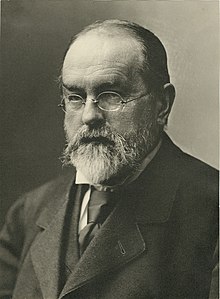|
Josef Rheinberger
Josef Gabriel Rheinberger (17 March 1839 – 25 November 1901) was an organist and composer from Liechtenstein, residing in Bavaria for most of his life. As court conductor in Munich, he was responsible for the music in the royal chapel. He is known for sacred music, works for organ and vocal works, such as masses, a Christmas cantata and the motet Abendlied; he also composed two operas and three singspiele, incidental music, secular choral music, two symphonies and other instrumental works, chamber music, and works for organ. Life and careerRheinberger was born on 17 March 1839 in Vaduz as the son of Johann Peter Rheinberger and his mother Elisabeth Carigiet as one of eleven children, including his brother Peter Rheinberger.[1] When only seven years old, he was already serving as organist at the Vaduz parish church, and his first composition was performed the following year. In 1849, he studied with composer Philipp M. Schmutzer (31 December 1821 – 17 November 1898) in Feldkirch, Vorarlberg.[2]  In 1851, his father, who had initially opposed his son's desire to embark on the life of a professional musician, relented and allowed him to enter the Munich Conservatorium. Not long after graduating, he became professor of piano and of composition at the same institution. When this first version of the Munich Conservatorium was dissolved, he was appointed répétiteur at the Court Theatre, from which he resigned in 1867.[3]  Rheinberger married his former pupil, the poet and socialite Franziska "Fanny" von Hoffnaass in 1867. They had no children. Franziska wrote the texts for much of her husband's vocal work. The stylistic influences on Rheinberger ranged from contemporaries such as Brahms to composers from earlier times, such as Mendelssohn, Schumann, Schubert and, above all, Bach. He also painted for literature in English and German. In 1877, he was appointed court conductor, responsible for the music in the royal chapel. He was subsequently awarded an honorary doctorate by Ludwig Maximilian University of Munich. A distinguished teacher, he numbered many Americans among his pupils, including Horatio Parker, William Berwald, George Whitefield Chadwick, Bruno Klein, Sidney Homer and Henry Holden Huss. Other students of his included important figures from Europe: Italian composer Ermanno Wolf-Ferrari, Serbian composer Stevan Stojanovic Mokranjac, and German composers Engelbert Humperdinck and Richard Strauss and the conductor (and composer) Wilhelm Furtwängler. See: List of music students by teacher: R to S#Josef Rheinberger. When the second (and present) Munich Conservatorium was founded, Rheinberger was appointed Royal Professor of organ and composition, a post he held for the rest of his life. On 31 December 1892, after a long illness, his wife died and two years later poor health led him to give up the post of Court Music Director.[4] His religious works include twelve masses (one for double chorus, three for four voices a cappella, three for women's voices and organ, two for men's voices and one with orchestra), a Requiem and a Stabat Mater. His other works include several operas, symphonies,[5] chamber music, and choral works. The former grave in Munich. The grave in Vaduz. Today Rheinberger is remembered above all for his elaborate and challenging organ compositions; these include two concertos, 20 sonatas in 20 different keys (of a projected set of 24 sonatas in all the keys),[6] 22 trios, and 36 solo pieces. His organ sonatas were once declared to be
Rheinberger died in 1901 in Munich, and was buried in the Alter Südfriedhof. His grave was destroyed during World War II, and his remains as well as those of his wife were moved to his home town of Vaduz in 1950.[3] CompositionsThis list only mentions works that were assigned an opus number by Rheinberger himself.
Recordings
References
Other sources
External linksWikimedia Commons has media related to Josef Gabriel Rheinberger. Free scores
Commercial publishers
Free recordings |
||||||||||||||||


